- Home
- Tim Winton
Shallows Page 3
Shallows Read online
Page 3
‘Piss off, I’m busy.’
‘Listen,’ Queenie said soothingly. ‘Would you like to come and stay in Angelus with us for a few weeks?’
‘In that shithole? With that idiot?’
‘He isn’t an idiot.’
‘What would you know?’
She kissed him coldly on the stubbled cheek and left him.
Cleve revved the Land Rover, pulling his sunglasses down over his eyes. She climbed in and slammed the door.
‘Got your bag?’
‘I haven’t got a bag, you bloody twit.’
He let the clutch out too quickly and stalled the engine, confused.
Coupar watched the dust lift in the distance until it was claimed by the steel-blue sky. Coupar, you stupid bastard, he thought. He berated himself for giving them the teeth. He somehow had the notion that it meant something bad, and he cursed his hunger for goodwill, for affection even, wondering why on earth men ever needed either; knowing full well. ‘Don’t try me any more,’ he whispered. ‘Make it rain.’
Nearing Angelus on the road home, the Cooksons listened to the local radio station. Rain was forecast in Angelus and the western south coast, no change in the east. Then began the daily catch report from the Angelus Tourist Bureau: ‘. . . wish to advise that seven whales have been taken by the Paris Bay Whaling Company and flensing will be in progress throughout the day, so don’t . . .’ the announcer was cut short by a jab of Queenie’s thumb.
‘What’d you do that for?’ Cleve protested. ‘I was listening to that.’
‘Sorry. I don’t want to.’
A clutch of cockatoos flushed across the road ahead. On the gravel edges the broken bodies of twenty-eight parrots caught their eye.
‘What’s the matter?’
‘I just don’t want to hear how many whales they slaughtered last night, okay?’
‘Happy anniversary,’ Cleve said.
They drove in silence into town, crossed the tiny Hacker River bridge and saw the birds skidding on the flats near where squatters had moved back to live in the warped shacks built by the failed hobby farmers from the city. They drove past Angelus Oval as dusk fell, past the glare of the pubs and tourist motels to the old Coupar house at the base of Mount Clement. It was clear to both of them: there would be an argument tonight.
IV
Through perforations in the shivering tin walls of the shed, Cleve saw the light of the old men’s lamp and closed his Penguin edition of Moby Dick.
He heard the rats outside, on the roof, around the slippery piles, making raspy noises with claws and throats. Two hours before, a pair of bored policemen had sat outside with .38 revolvers picking rats off between cigarettes and station gossip until they ran out of ammunition and cigarettes and had only the gossip to sustain them as they walked ashore. The rats ate their dead; there seemed no fewer rats than before.
Buttoning his greatcoat, he crossed the open-slatted floor through which the water showed in strips, and opened the door and braced against the cold charge of night air. He pulled up his collar and descended the steps to the lower platform from where the light shone. Neither Dick nor Darcy looked up from the radiant, aquamarine water which was alive with the boiling movement of garfish and whitebait and yellowtail.
‘No bites?’ Cleve asked.
The old men looked at him indulgently from their greatcoat. ‘Oh, bites,’ Dick nodded vaguely. The old men had no bag or bucket; they sat with their backs to the timber shoring someone had nailed up for them as a windbreak years ago, and they were comforted by the niggling attention the fish gave to their oversized baits.
Cleve had never seen them catch a fish. He sat near them in the lee of the windbreak and watched and hoped that perhaps tonight they would speak to him. He looked out over the water. The deepwater jetty was several hundred yards long and slightly doglegged, underslung with scale-encrusted platforms from which the locals fished. Tankers berthed out on the paw of the dog’s leg. A quarter of a mile away, the town jetty was chafed by three vessels from the Paris Bay Whaling Company whose land-based station lay just outside the harbour on the lower reaches of the Sound. The town jetty also protected the sleek shape of the cruiser Bulldozer, owned by Ted Baer, world-famous game fisherman, who had this night arrived in Angelus.
‘Yer the youngest this jetty’s seen.’
Cleve started, shocked. One of the old men was speaking to him.
‘Pardon?’
‘You must be the youngest watchman this lot’ve firewood’s ever had,’ Dick said, muffled in his coat.
‘Yeah?’ Cleve was too excited to speak. ‘Yeah?’
‘It’s a no-hoper’s job, that. Drunks, old sailors, retired cockies, respectable gents like Darcy an’ m’self,’ he bubbled, half laughing, half coughing, and he spat. The southerly caught the creamy yellow phlegm and hurled it out – two gobbets linked by an elastic tether – spinning into the darkness.
Cleve gathered his wits and spoke. ‘You fellas used to do this job?’
The old men looked sideways at Cleve and returned their attention to the weaving needlepoints of fish. At that moment footsteps rang out above and Cleve bounded up the steps and the old men shook their heads.
After he had seen the last of the drunken, randy, foul-smelling merchant seamen out of his hut, having helped them sign their signatures and fended off their mistaken advances and watched them totter dangerously along the final length of the jetty to their ship, he poured himself coffee and opened the journal of Nathaniel Coupar and read.
June 2, 1831 In the past days I have all but lived in this lonely lookout with my eyes fixed upon the ocean. Each day brings poorer weather, more cold, more depressing drizzle and a deathly greyness to the complexion of the sea. I feel some foreboding deep within me, but I cannot make sense of it. No whales have been sighted in this, the so-called Bay of Whales.
If this fishery does not improve we will arrive back at the Derwent deeper in debt and no better off than British convicts.
June 3, 1831 It rains perpetually as though God weeps over this strange, grey coast. There was fighting in the farthest tent last night. That Leek . . .
June 5, 1831 Huts complete and tryworks much improved: 4 huts; two for boats’ crews, one for headsmen Finn and Jamieson, another for shoremen (cook, cooper, carpenter) and harpooneers, and the last is store and galley.
June 6, 1831 Praying that Nowles, who now sleeps above, can throw a harpoon as powerfully as he snores! It is somehow odd to be so dependent upon such unpredictable creatures as whales, and to need to kill them to be redeemed from debt.
June 7, 1831 I write again from the lookout. Ocean impenetrably black. I squat beneath the canvas and the rain whispers. I am a poor lookout.
June 8, 1831 At dawn this morning natives arrived at our encampment in dismal rain. Thin, blue-black men clad in animal skins with spears and curious side-arms. Massacre was prevented by the good wit of Mr Jamieson who prevented Leek from attacking the blackfellows with his lance. Much of this I saw after leaving my post and creeping down through the scrub to observe from a safe and secret distance. Much jabber, some laughter from our men, much misunderstanding and little gained in this exchange forsook for the shelter of the lookout. My heart all but stopped when I reached the lookout high above the beach and saw the distant, twin-plumed spout rising in the bay. I took up my tin tub and beat it like a drum and sounded the alarm . . .
Cleve sat back with a jerk and listened to the hollow thud of footsteps travelling in the timbers of the jetty, ringing closer for a full minute until he was moved to close his book and slip it into his Gladstone bag. The footfalls came closer. The door swung open.
‘Well, don’t just sit there gawking,’ Queenie said, standing legs apart, big as a sailor in her scarf and greatcoat. ‘Sign me on, skipper.’
Cleve got to his feet, hands falling from his pockets. ‘What are you doing here?’ He laughed, hugging her across the table until she overbalanced and fell onto her elbows. She pulled a grea
sy flourbag from her coat and a spool of nylon line from the pocket of her jeans.
‘Thought I might do some fishing.’
‘At this —’
‘Too cold for you, huh?’ There was water in her eyes. Queenie and Cleve had spoken little since their return to Angelus, avoiding each other, aware of some new element between them.
‘No, no,’ he stammered, frightened of the tears.
They descended the stairs in the light of Dick and Darcy’s lamp. The rain had ceased and stars sprayed light all over the black pan of the sky. The old men looked up when they heard Queenie’s voice and adjusted themselves within their coat.
‘Hello,’ Queenie said.
They nodded and smiled. Darcy’s mouth was a black hole and Dick had some teeth the colour of barnacled piles.
Queenie unspooled some line, baited a small hook with a wisp of mussel-flesh from the shells in her pockets, and cast it into the bright, cold water. Her small fingers were blue and the line left white chinks when she moved it in her hands. Cleve watched her hands and the careering silhouettes of the fish and glanced across at Dick and Darcy whose lines were jerking with bites. They sat holding trembling lines, leering benevolently at Queenie.
Queenie caught three herring within a few minutes and the little bodies lashed about inside her bag. She fished as intensely as the old men, eyes drawn to the water.
‘You’re doing all right,’ Cleve said, shrinking into his coat with some inexplicable feeling of unease. ‘Hey,’ he called to the old men, ‘looks like you blokes’ll have to take lessons from this one.’
They grinned, hands jerking.
‘Why don’t you pull in?’ Queenie asked them, feeling their gaze upon her.
They shrugged and Darcy giggled and Dick drew a bottle from the depths of their coat and offered it. Cleve took it, saw it was invalid port, hesitated, and took a swig. He rubbed the bottle mouth and offered it to Queenie who glared at him and drank. It was warm, vigorous, medicine-tasting stuff.
‘A lot of fish down there,’ she pointed, coughing. ‘Attracted by the light, I suppose.’
The old men nodded. The Cooksons looked briefly and blankly at each other. Cleve noticed a lick of hair caught in the corner of her mouth like a fine scar and put his finger to it; she flinched away, watching the fish enter and leave the light in neat, thick schools. In the glare itself the fish were confused and blinded and swam madly.
When Queenie began to shiver they gathered up line and bait and Queenie bade goodbye to the old men and they climbed the steps to the shed.
‘Bloody idiot,’ one of the old men muttered in his coat as the young couple entered the shed.
‘Yairs,’ the other said. ‘A right one.’ They fished and gargled invalid port and the clear sky brought a more intense chill down upon them.
Inside the shed the Cooksons ate stale biscuits and drank coffee Cleve heated in the old jug, and they savoured the steam that rose into their faces and thawed their cheeks. After laying the three little fish out on the floor to see their size, Queenie carefully picked off the transparent scales that had grafted themselves onto her palms and forearms. The shed smelt of burning dust from the old bar heater in the corner, and there was also the more subtle odour of moist fish. All along the platforms and ladders and railings and companionways beneath the whole length of the jetty, the darkness moved with rats.
‘I used to fish down here when I was a little girl, when Poppa brought me into town,’ Queenie said, looking at her boots.
Cleve cast her a whimsical, knowing glance. You still are a little girl, he thought; you haven’t changed at all. I bet Dick and Darcy lusted after you ten years ago on this same jetty.
‘Always wondered what was in this shed,’ she said.
‘Only rats. And me,’ he smiled.
Queenie yawned. Why are you watching me so carefully? she wondered, flicking her hair for his benefit. God, I’m so tired of this place. The salt-stains on the walls, the bold shuffle of rats, the smell of the canning factory across the water, the opaque smile of her husband: every sound and sight irritated her. She felt trapped again.
Cleve retracted from her cool, hard stare, even willed himself away from the seductive movements of her hands as they fleeced themselves. Don’t blame me, girl, he thought. Your grandfather pushed me into this. This is the only job I can get in this town now. Anyway, I like it; it’s mine.
Queenie did not relax her gaze, thinking: Look at you, pretending you’re not here with me, as though you’re some autistic child. Those old men know I’m here, God, don’t they? Queenie remembered this man scissored in her thighs in the waterfall, in the bottom of the dinghy floating downstream. You would have died but for me then, Cleve, in that boat on the water when you cried loving me: you would have stopped living had I jumped out and swum away and left you wanting.
Her coffee went cold; the black surface stained a line halfway down the cup and she saw her own eye in the black.
‘Cleve.’
His head wavered; he had almost dozed off.
‘I want to know something.’
‘What?’
‘I want to know why you’re reading the journals. I want a decent answer.’
Just like a Coupar, he thought. She demands me to justify my existence, my reading habits, even. He rubbed his palms into his eyes, deliberating behind his palms. Queenie thought: Why do you have to float off without us? We don’t need any more diversions! You can’t leave me alone!
But Cleve only sighed. He loved this woman. There was nothing left that meant more to him. The only happy days in his life had been spent with her. Their love had brought him life, colour, hope; and now he was almost able to stand back and see himself flirting with loss. It astounded him. But he did nothing to arrest it. Reading this journal had given him something more: he was embracing something aged, an offering from the man he feared and loathed and loved – Daniel Coupar.
‘Don’t hurt us, Cleve,’ Queenie said, wondering why she should feel this pity for him.
‘It’s about your family, okay?’
‘Our family’s a myth.’
‘Maybe.’
‘You and me, we’re not.’
Cleve shrugged. ‘I love you, Queen.’
‘That’s junky talk.’
He laughed. It was the ambiguity of laughter that drove Queenie to the door. The door slammed and the hut rocked with the force of it. Her footsteps clattered away and Cleve was left to observe the three little fish she had left on the floor, dried crisp as biscuits. He kicked them between the boards and they landed with little smacks on the water below.
. . . At half past one Jamieson’s boat came into view and judging by the briskness with which the men were putting-to at the oars it was apparent that no whale was in tow. As we dragged the boat up the beach I saw empty line tubs and knew a tussle had occurred. The men were in a black mood. I was told that there had been an accident, that Nowles had stumbled over the clumsy-cleat after striking a black cow and wedged his fingers between rope and gunwhale. To prevent capsizing, Mountford seized the hatchet and severed the rope. Someone has said that Mr Jamieson ordered the severance of the fingers and not the rope, but I cannot believe this. Men are not so barbarous as that; we are Americans.
There have been crew changes. Cain has become our harpooneer, Leek is Mr Finn’s man.
During the flensing of Mr Finn’s bull, the natives appeared from the rainy, misty gloom and presented our headsman with tough little roots like lepers’ hands which burn hotly and fiercely, and beckoned in return for flesh from the carcass of the whale which they ported back into the bush upon their shoulders.
Half the night men with lanterns moved over the great carcass looking very like Mr Swift’s Lilliputians poring over Gulliver. The creature’s black gloss danced with firelight, flames boomed beneath the pots fuelled by roots the natives brought us wrapped in animal skins, and oil glistened on the faces of all.
Sleep is still denied me, for the night is
filled with the squirmings and moanings of poor Nowles in the bunk above. How lonely is the sound of a man in pain! There is nothing more solitary; it cannot be shared and a man is isolated in his own sea, the swirling rip-current that is pain. Nowles tosses and pitches his way in the dark. Do I wish to share his pain to ease his burden? No, I am ashamed, but I can only hate him for his pain and his noise and I want him away or dead to leave me some peace and some sleep for what is left of the night.
I am tired and I write with only moonlight over my shoulder. Nowles is calling: ‘Gone! Gone!’, and now dawn insinuates itself greyly, or do I just imagine so?
At five-thirty the shift-siren at the canning factory on the foreshore screamed. Cleveland Cookson woke with his head on the open journal. He spat through the planks into the half-light below; his teeth felt as though they were coated with Campbell’s Cream of Mushroom Soup. Gulls scratched the roof. The rats had gone. He nursed his headache for an hour and a half until the day man, a short, porky, drunken fellow whose name continually failed to imprint itself upon Cleve’s memory, came to the door in his creased and tired manner to relieve him.
On the lower platform Dick and Darcy lay asleep in each other’s arms, the bottle lying uncorked and empty near their feet, lines in the water.
Walking along the jetty towards the shore with its festooning seabirds and brisk-walking shift workers converging on the canning factory, Cleve realised for the first time how long the structure really was. His own house on the hill, so clear in the dawn with sunlight glinting from the kitchen window, was a small square that got no bigger for all his walking.
When he finally reached the gravel path at the end and the dug sand of the foreshore where Queenie had got her mussels, it felt like lunchtime, and the sound of gravel beneath his feet was like the gnawing, scratching of rats.
V
‘Twice a year Bill lets me come on these tours,’ the robust woman with ham-like arms was saying to her big-chested companion, a woman who ate raisins out of a long, crinkly cellophane bag, ‘to let me hair down and see all the natural sights again it just makes yer young and patriotic again Lily like when me and my Bill was courtin’ though Bill’d never come on a tour he’s got his dogs and the model trains and keepin’ the little Eyetalian kiddies from next door off the kangaroo paw and Perth’s such a fast city you need a break from it every now and then oh Lily Angelus’s such a lovely place all the beaches and bays it’s such a beautiful place full of history and things and the people are friendly do you ever see Margie Camberwell no I thought she said Hacker River no I couldn’t eat raisins the way you do Lily it would wreak havoc on my bowels bound up a bit are you luv well there’s nothing better oh these young people are lovely but so nervous they’re like they’re on a tour behind the Iron Curtain poor things you know if we were on a tour like this when we was young we’d be havin’ a sing-along happy as Larry so much pressure on young people today you never hear ’em sing oh Bill’s sciatica’s bad Lily . . .’

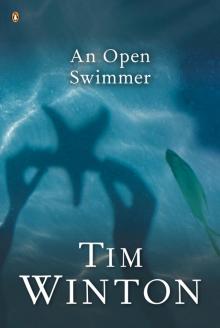 An Open Swimmer
An Open Swimmer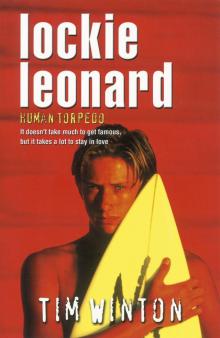 Human Torpedo
Human Torpedo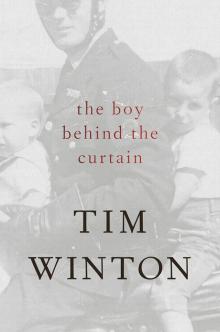 The Boy Behind the Curtain
The Boy Behind the Curtain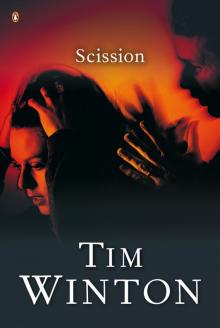 Scission
Scission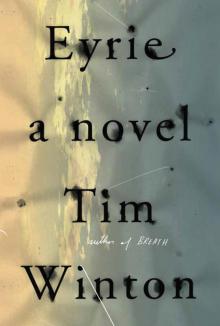 Eyrie
Eyrie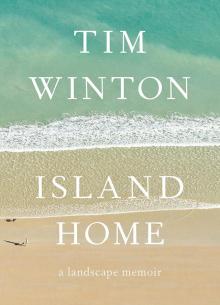 Island Home
Island Home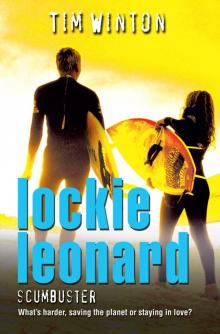 Scumbuster
Scumbuster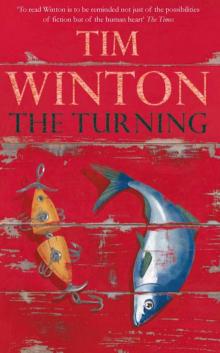 The Turning
The Turning Legend
Legend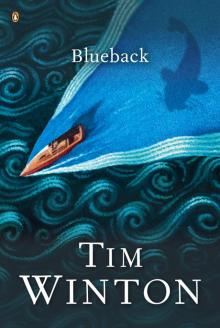 Blueback
Blueback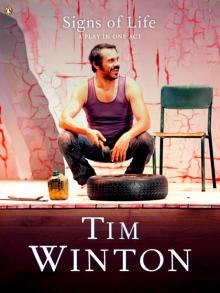 Signs of Life
Signs of Life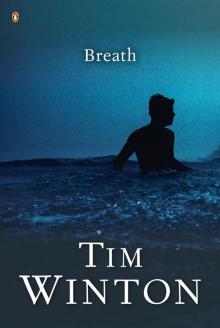 Breath
Breath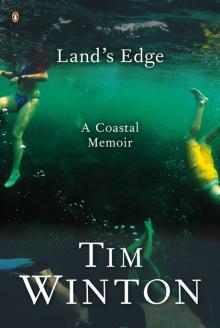 Land's Edge
Land's Edge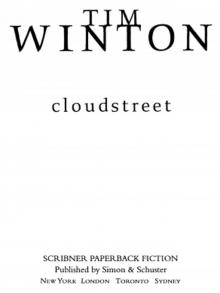 Cloudstreet
Cloudstreet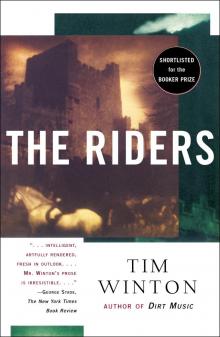 The Riders
The Riders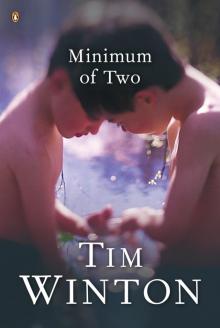 Minimum of Two
Minimum of Two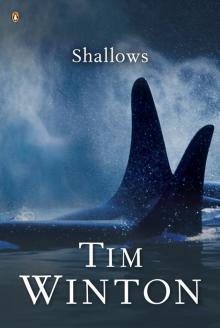 Shallows
Shallows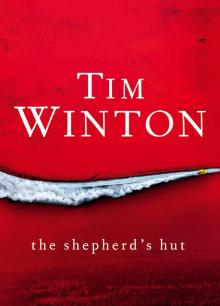 The Shepherd's Hut
The Shepherd's Hut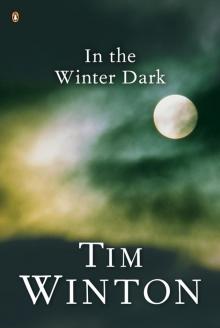 In the Winter Dark
In the Winter Dark